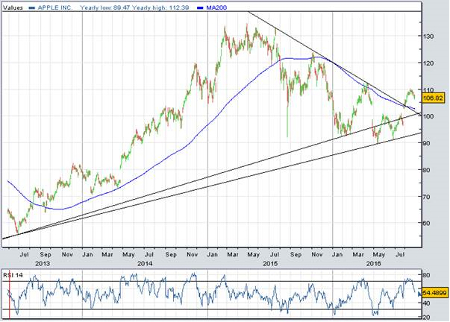Apple handed €13bn tax bill
30th August 2016 15:12
by Lee Wild from interactive investor
Share on
Surprise, surprise, is in trouble with the authorities over its tax affairs. It's regularly attacked in the press for hoarding cash overseas to avoid a huge tax bill for repatriating money earned outside the US. Now, the world's eighth largest company has been told it owes Ireland as much as €13 billion (£11 billion) in back taxes, plus interest.
After an investigation lasting three years, the European Commission decided that Ireland handed Apple the record sum in undue tax benefits. That's illegal under EU state aid rules, so Ireland is being ordered to recover the "illegal aid".
"This selective treatment allowed Apple to pay an effective corporate tax rate of 1% on its European profits in 2003 down to 0.005% in 2014," announced Danish commissioner Margrethe Vestager, in charge of competition policy. The standard rate of Irish corporate tax is 12.5%.
Although Ireland has "substantially and artificially" lowered the tax paid by Apple in Ireland since 1991, the Commission can only order recovery of illegal state aid for a ten-year period preceding the Commission's first request for information, which was in 2013.
While €13 billion sounds like a lot of money - and it is - it's just a drop in the ocean for Apple, which last year made net income of $53.4 billion (£40.7 billion) on revenue of almost $234 billion. Predictably, however, both the company and the Irish government plan to appeal.

US corporate tax is levied at 35% minus whatever the tax rate is where a US firm earned its money. Some is funnelled back to the states to finance research and development, but Apple's hoard of offshore cash was recently put at around $215 billion.
Regular calls for US repatriation tax reform have been rejected, although there is hope something could happen soon. If it does, analysts say that if Apple paid, say, 20% tax, the money brought home, added to the cash pile, would equal nearly half the company's market cap.
It would certainly give Apple's share price a much-needed boost. As high as $133 a share as recently as July 2015, the price fell below $89.50 in May. There has been some improvement since, and Warren Buffet, who paid an average of $109 for a large stake earlier this year, is now almost break-even.
Buffett is no techie, and Apple shares started Tuesday's session lower. And he's not infallible (remember his disastrous investment in ), but plenty of investors are still prepared to back him.
Quarterly revenue fell more than expected earlier this year, and a slump in China was a huge scare. But the third quarter to June, despite a year-on-year decline in sales and profit, still beat expectations and tips fourth-quarter revenue to be between $45.5 billion and $47.5 billion. Last year it was $51.5 billion.
And there could be a lift from the launch of Apple's iPhone 7, widely anticipated in September. Expectations are so poor that it wouldn't take an awful lot to beat estimates, and chief executive Tim Cook will be desperate to move on from the Steve Jobs years and make his own mark on Apple.
Although the shares are modestly rated - about 12 times forward earnings - Cook has much to prove, and he really does need a great product launch, both for Apple and his own sake. We may only have days to wait.
This article is for information and discussion purposes only and does not form a recommendation to invest or otherwise. The value of an investment may fall. The investments referred to in this article may not be suitable for all investors, and if in doubt, an investor should seek advice from a qualified investment adviser.